| Listing 1 - 10 of 77 | << page >> |
Sort by
|
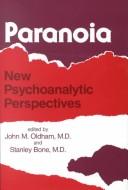
ISBN: 0823639851 9780823639854 Year: 1994 Publisher: Madison International universities press
Abstract | Keywords | Export | Availability | Bookmark
 Loading...
Loading...Choose an application
- Reference Manager
- EndNote
- RefWorks (Direct export to RefWorks)
Paranoia. --- Paranoia --- Psychology, Pathological --- Psychoses
Book
ISBN: 9782130534617 2130534619 Year: 2007 Volume: 3784 Publisher: Paris: PUF,
Abstract | Keywords | Export | Availability | Bookmark
 Loading...
Loading...Choose an application
- Reference Manager
- EndNote
- RefWorks (Direct export to RefWorks)
On se sent " parano " lorsque s'impose comme une évidence l'impression de ne croiser que des regards méprisants ou hostiles qui, prétendant vous ignorer, n'en pensent pas moins et révèlent, tout en le dissimulant, l'existence d'une entente hostile ou pire, d'un complot dont vous êtes, pour une raison qui reste à comprendre, la victime cernée de toutes parts. La banalisation de ce terme, du fait qu'une forme atténuée de paranoïa est relativement commune, ne doit pas masquer sa signification réelle et la souffrance qu'elle implique pour le paranoïaque comme pour son entourage. Car la paranoïa est toujours un redoutable ferment de destruction de l'autre par la méfiance et la violence qu'elle génère dans la vie relationnelle du couple, de la famille et du milieu professionnel ou socio-politique
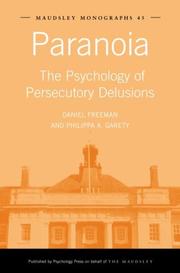
ISBN: 184169522X Year: 2004 Publisher: Hove, East Sussex, UK ; New York, NY : Psychology Press,
Abstract | Keywords | Export | Availability | Bookmark
 Loading...
Loading...Choose an application
- Reference Manager
- EndNote
- RefWorks (Direct export to RefWorks)
Delusions --- Paranoia --- Paranoïa. --- Hallucinations et illusions. --- Paranoia. --- Delusions.
Book
ISBN: 0898590280 Year: 1980 Publisher: Hillsdale Erlbaum
Abstract | Keywords | Export | Availability | Bookmark
 Loading...
Loading...Choose an application
- Reference Manager
- EndNote
- RefWorks (Direct export to RefWorks)
Cognition disorders --- Paranoia --- Schizophrenia
Book
ISBN: 3262001740 Year: 1978 Publisher: Nendeln, Liechtenstein : Kraus Reprint
Abstract | Keywords | Export | Availability | Bookmark
 Loading...
Loading...Choose an application
- Reference Manager
- EndNote
- RefWorks (Direct export to RefWorks)
Anorexia nervosa --- Delirium tremens --- Paranoia --- Exhibitionism.
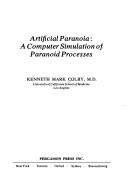
ISBN: 0080181619 Year: 1975 Publisher: Pergamon
Abstract | Keywords | Export | Availability | Bookmark
 Loading...
Loading...Choose an application
- Reference Manager
- EndNote
- RefWorks (Direct export to RefWorks)
Digital computer simulation --- Paranoia --- Psychiatry --- Data processing
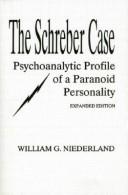
ISBN: 0812904206 Year: 1974 Publisher: New York (N.Y.): Quadrangle/The New York Times book
Abstract | Keywords | Export | Availability | Bookmark
 Loading...
Loading...Choose an application
- Reference Manager
- EndNote
- RefWorks (Direct export to RefWorks)
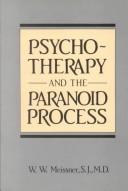
ISBN: 0876687524 Year: 1986 Publisher: New York (N.Y.): Aronson
Abstract | Keywords | Export | Availability | Bookmark
 Loading...
Loading...Choose an application
- Reference Manager
- EndNote
- RefWorks (Direct export to RefWorks)
Paranoia --- Psychotherapy --- Paranoid Disorders --- Psychotherapy --- Treatment --- psychology
Book
Year: 2019 Publisher: Gothenburg Kriterium
Abstract | Keywords | Export | Availability | Bookmark
 Loading...
Loading...Choose an application
- Reference Manager
- EndNote
- RefWorks (Direct export to RefWorks)
"In inter-war Sweden, the psychiatric diagnosis of psychopathy served as a controversial but powerful tool for the management of people who failed to live up to contemporary civic ideals. The diagnosis was based on theories of a broad spectrum of biologically-based disorders in the borderland between normality and actual mental illness. The disturbances were assumed to manifest themselves as, for example, homosexuality, hysterical attacks, emotional coldness, mythomania, or restlessness.Another controversial diagnosis was paranoia querulans or querulous paranoia, a disease that was linked to the emergence of the modern state and its rule of law, and thought to manifest itself mainly in hyperbolic complaints against supposed wrongdoings. Thus, the disorder implicated an excessive use of one's civil rights. A particular dilemma related to this disease was that the kind of behaviour that had usually led to the diagnosis and subsequent psychiatric confinement, namely a ardent manner of writing letters to public authorities, was precisely what was required for discharge.In De samhällsbesvärliga (The Social Troublemakers), historian of science and ideas Annika Berg examines how patients described as psychopaths or querulants could negotiate for discharge with doctors and authorities in 1930s and 40s Sweden. This was a period in time when the system of psychiatric care in Sweden was greatly expanded in answer to a perceived shortage, but was also transformed into a somewhat more open apparatus with possibilities to apply for preliminary discharge and other forms of outpatient solutions. It was also a time when psychiatry was under attack from different quarters, and psychiatrists were accused of using flexible diagnoses such as psychopathy to confine people wrongly. Against this backdrop, how did the management of psychopaths and querulants fit with contemporary ideals of citizenship and democracy? How did the patients view themselves? And how were negotiations in individual cases affected by notions of, for example, class, gender and sexuality?"
Psychiatry --- Psychopathy --- Paranoia querulans --- Diagnoses --- confinement --- intersectionality
Book
ISBN: 1501732420 Year: 2018 Publisher: Ithaca, NY : Cornell University Press,
Abstract | Keywords | Export | Availability | Bookmark
 Loading...
Loading...Choose an application
- Reference Manager
- EndNote
- RefWorks (Direct export to RefWorks)
"Don Quixote is the first great modern paranoid adventurer.... Grandiosity and persecution define the characters of Swift's Gulliver, Stendhal's Julien Sorel, Melville's Ahab, Dostoyevsky's Underground Man, Ibsen's Masterbuilder Solness, Strindberg's Captain (in The Father), Kafka's K., and Joyce's autobiographical hero Stephen Dedalus.... The all-encompassing conspiracy, very much in its original Rousseauvian cast, has become almost the normal way of representing society and its institutions since World War Two, giving impetus to heroic plots and counter-plots in a hundred films and in the novels of Burroughs, Heller, Ellison, Pynchon, Kesey, Mailer, DeLillo, and others."-from Paranoia and ModernityParanoia, suspicion, and control have preoccupied key Western intellectuals since the sixteenth century. Paranoia is a dominant concern in modern literature, and its peculiar constellation of symptoms-grandiosity, suspicion, unfounded hostility, delusions of persecution and conspiracy-are nearly obligatory psychological components of the modern hero.How did paranoia come to the center of modern moral and intellectual consciousness? In Paranoia and Modernity, John Farrell brings literary criticism, psychology, and intellectual history to the attempt at an answer. He demonstrates the connection between paranoia and the long history of struggles over the question of agency-the extent to which we are free to act and responsible for our actions. He addresses a wide range of major authors from the late Middle Ages to the eighteenth century, among them Luther, Bacon, Cervantes, Descartes, Hobbes, Pascal, La Rochefoucauld, Swift, and Rousseau. Farrell shows how differently paranoid psychology looks at different historical junctures with different models of agency, and in the epilogue, "Paranoia and Postmodernism," he draws the implications for recent critical debates in the humanities.
Personality and culture. --- Agent (Philosophy) --- Paranoia in literature. --- Paranoia --- Civilization, Modern --- Philosophy. --- Psychological aspects.
| Listing 1 - 10 of 77 | << page >> |
Sort by
|

 Search
Search Feedback
Feedback About
About Help
Help News
News